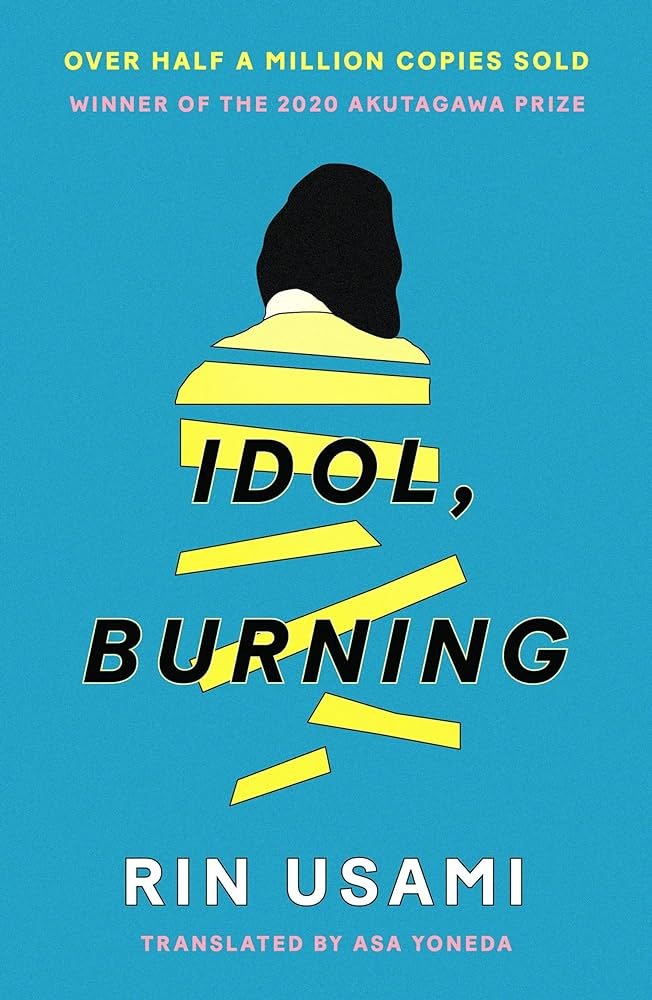Idol, Burning by Rin Usami, translated by Asa Yoneda (Canongate)
Idol culture in Japan is a multi-billion dollar business. The Golden Age of idols is said to be the seventies with artists such as Momoe Yamaguchi and Akina Nakamori. The end of the seventies was the rise of idol groups such as Pink Lady, Candies, and Wink.
In the mid-eighties, an idol group with a large number of members was conceived by producer Yasushi Akimoto. He was the mastermind behind Onyanko Club, a group that consisted of fifty-two original members. Each member was assigned a number so fans could easily follow their favorites.
The nineties would see a revival of idol groups with a large number of members, the most popular being Morning Musume, produced by former lead singer of Sharan-Q, Tsunku. The group was formed on a television audition program called Asayan. The production company Hello! Project also produced groups such as Country Musume, Coconut Musume, Berryz Koubou, °C-ute, and Melon Kinenbi, with most groups consisting four to eight members.
However, the 2000’s would see the rise of AKB48 and all its offshoots, once again produced by Yasushi Akimoto. The concept of the group was “Idols you can meet”. Their homebase was in Akihabara where the group had their own theater. Every year, an “election” would be held and fans would vote for their favorite members. The member with the most votes would be chosen for the center position for the next single.
Fans continue to support their favorite members, not only in idol groups, but also actors, voice actors, anime characters, sports figures, and a whole host of others. The current term being used is 推し (oshi), meaning your favorite. One of the most popular manga and anime series now is 推しの子 (Oshi no Ko) which roughly translates to "My Favorite”.
Idol, Burning takes the life of the superfan to a different level. Akari is a high school student who has only one passion in her life and that is her oshi, her idol. His name is Masaki Ueno and he’s a member of popular idol group Maza Maza.
However, Akari’s world is being turned upside down. Her oshi is on fire. The news media says that Masaki punched a fan. Akari doesn’t know if the news is true or just a rumor but the Internet is ablaze with people criticizing the star while others like Akari, continue to support him.
In a news segment, Akari’s oshi admits to punching a fan but said it was a private matter between him and the victim. The Internet is soon inundated with comments about him after the interview.
Akari sees a number of negative comments on the Internet such as , “Who the f&*k does he think he is?” and “I’ve been going to his shows for years but I’m done. If you’re a brainwashed cult-follower victim-bashing the woman you’re not right in the head”. Of course there were some positive comments as well such as, “Learn your lesson and come back soon. We’re here for you Masaki”.
Masaki Ueno has been Akari’s oshi for about a year. Everything has centered around supporting him. She has spent that time collecting as much information as she could so she feels she could predict most of his answers at a Q&A corner of his fan meetings.
She sums up her feelings by writing on her blog for other Masaki fans, “There is nothing you can really do about a fireball, is there?”, referring to the comments on the Internet after the incident. “The blaze gets fanned from all directions, and just when you think they’re starting to die down, someone tosses on more fuel, in the form of old tweets or photos, and sends the flame in a new direction”.
Shortly after the incident, Maza Maza holds a press conference to announce that the group would disband and that their upcoming concert would be their last. Masaki also announces that he would be retiring from the entertainment business.
Akari is now at her wits end as her life has only held meaning because of her oshi. All the money she made from working part-time went to going to his concerts, buying his goods, and supporting him as any hardcore fan would. The support of her oshi borders on obsession. What will Akari do now that she has nothing to live for?
Rin Usami’s story is not only a coming-of-age story but also a parable about superfans and their oshi. Usami says in an interview, “To those who are not interested, the act of pursuing an idol can easily be dismissed as ‘only a hobby’ or ‘an unhealthy obsession’”. She further elaborates by saying, “But for some of those who do pursue an idol, it can become a reason to live or even be their salvation”. She wrote the book from the perspective of a superfan as she believes most people do not completely understand them and believes they are widely misunderstood.
The main point of Usami’s story is for the reader to imagine what they would do, if the “meaning” or the “backbone” of their life were to disappear. How would they survive? What would they do?
Imagine if you are a hardcore fan of former California Angels’ superstar Shohei Ohtani. What will do now that he is going to become a member of the Los Angeles Dodgers? Will the Internet go on fire because he decided to change teams?
In the age of SNS, there is no telling what people will say. However, if Shohei Ohtani was your oshi, even if he changed teams, wouldn’t he still be your oshi? It’s something to think about.~Ernie Hoyt
